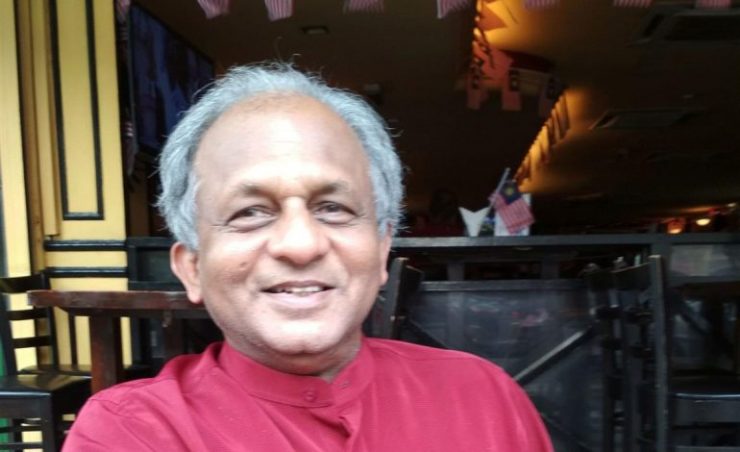Occupational therapy is not a career that one often hears about. However, the more this writer learns about the client-centred profession, the more impressed I become.
Occupational therapists are professionals who work with individuals of all ages and abilities, to address the difficulties – psychological and physical – that hinder them from living their fullest lives.
“Occupations” refer to the daily activities that people do as individuals, in families and within communities to bring purpose to their lives. In a nutshell, the primary goal of occupational therapy is to help people to participate in the meaningful occupations of everyday life, easily.
In May, occupational therapist and dean of the Perdana University School of Occupational Therapy (PUScOT), Professor Nathan Vytialingam, 65, was conferred the World Federation of Occupational Therapists Honorary Fellowship at the 17th Congress 2018 in Cape Town, South Africa.
The accomplished Malaysian proudly made history as the first person from the Asean region to receive this award. Since 1954, there have only been 41 such Honorary Fellowships conferred.
According to the World Federation of Occupational Therapists (WFOT), this is the highest functioning award for outstanding contributions and distinguished service to the profession. And with 44 years of experience and unrivalled achievement, it’s no surprise that Prof Nathan was honoured.
“I felt very emotional to have received a standing ovation from my colleagues. There are only 16 of us Fellowship holders in the world right now so it’s a real honour. I had a great mentor in the late Professor Dr Quazi M. Iqbal from Universiti Kebangsaan Malaysia who told me that, to excel, I should remain focused and stay the course,” says Prof Nathan.
An Ipoh boy, he was educated at St George’s Institution in Taiping, Perak.
“I always knew that I wanted to pursue a career in the field of health, but I didn’t want to become a doctor.
“I discussed my career path with the only speech pathologist in the country, who told me to go across the hall to the Occupational Therapy department. The rest is history. What appealed to me was the chance to work with children and adults with disabilities. It’s my calling!”

Professor Nathan Vytialingam (sixth from left), with Chief Operating Officer, Sarawak Convention Bureau, Amelia Roziman (fifth from left), president of the World Federation of Occupational Therapists, Marilyn Pattison (eighth from left), and the organising committee of the Asean Conference on Healthy Ageing 2017 in Sarawak. Photo: Handout
The professor graduated from the London School of Occupational Therapy in 1976 and was then awarded a Kellogg Fellowship to pursue his post graduate studies in Western Australia.
“There were days when we had to spend classes in a wheelchair or with our dominant hand in a sling! We did our chores and school work like that, which was illuminating, to say the least! We got a sense of what it meant to be disabled, which made us more empathetic.”
After graduation, Prof Nathan worked in Friern hospital in London and Singapore General Hospital before returning to Kuala Lumpur (University Hospital and General Hospital).
After practising for a number of years, the halls of academia beckoned and the good professor answered their call. He began teaching medical students at Universiti Kebangsaan Malaysia (1981-1990) and Universiti Putra Malaysia (2000-2013).

Professor Nathan Vytialingam
In 2013, Prof Nathan accepted a position as Dean of PUScOT.
The event’s success led to South Africa hosting the 2nd World Congress in 2015, and Turkey is getting ready to host the third next month.
The professor’s expertise did not go unnoticed and, in 2015, he was appointed a member of the advisory council of the Global Coalition on Ageing in New York.
When asked about the state of aged care in Malaysia, he replied: “The MHAS advises on issues of healthy ageing – regionally and internationally. We’ve also organised a conference on healthy ageing in Sarawak.” This conference will take place on Sept 22 and 23, in Miri. Prof Nathan will be one of the speakers. He will give an overview of healthy ageing and longevity, and speak about carers’ issues.
“Malaysia is signatory to treaties like the Madrid International Plan of Action on Ageing (2002). I’m sure that, with this present government, aged care will be a priority. Look at our Prime Minister – he’s the perfect example of healthy ageing!”
As for his future plans, the professor answers optimistically, “I want to write a Masters programme for PUScOT and ensure that the standards of the programmes I’ve set up are rigorously maintained. The WFOT is strict on standards, and the beauty of being recognised by the organisation is that it puts us on par with developed nations.
“I also hope Malaysia engages in more community outreach rehab programmes, especially for the elderly. They deserve to live lives of purpose and quality”.
How does the professor himself “age gracefully”? He replies, “I keep myself mentally and physically engaged. I challenge myself with new ideas to keep mentally active.
“Also, having a good circle of family and friends. I have warm and jovial people around me – that keeps me going and keeps me young at heart.
“Unwinding at the end of the day helps me to manage and reduce stress.”
His sons Kashvin, 31, and Kavish, 28, and daughter Kashya, 30, are following in his footsteps, in the sense of helping people. “They have community service at heart and have learned to do community work,” says Prof Nathan.
He ends with these poignant thoughts: “Everything I do is out of passion, not ego. It’s my patients and family who continually inspire me to reach greater heights. Being an occupational therapist has made me realise that my problems are minor in comparison to those faced by people with disabilities. It’s important not to sweat the small stuff”.
Source: Star 2
 Global Coalition On
Global Coalition On 